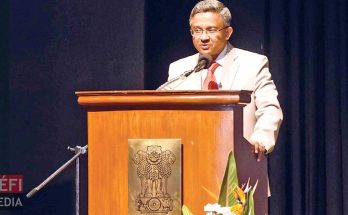 The June 9 operation into Myanmar against Naga insurgents was by all accounts very professionally executed. It showed coordinated and skillful action, presumably based on pinpointed intelligence. In addition there was a welcome show of political will. The impression also was that the Myanmar government was in the loop on this one, as all friendly governments would be in such cases.
The June 9 operation into Myanmar against Naga insurgents was by all accounts very professionally executed. It showed coordinated and skillful action, presumably based on pinpointed intelligence. In addition there was a welcome show of political will. The impression also was that the Myanmar government was in the loop on this one, as all friendly governments would be in such cases.
One grew up having been taught that special operations were a discreet affair, always with plausible deniability but the message was delivered to those who needed to be told or “fixed”. There was no public thumping of chests. The boys just went home and celebrated quietly in their messes with their own kind.
It seems all this is different now. No sooner had the operation against the Naga insurgents in Myanmar concluded, all of India knew. We have also been given details, at times apparently speculative and vague, of how the operation was conducted. There have been free and easy comments that the Myanmar government did not know about this operation that it was solely an Indian forces’ operation from the beginning to end. Such comments openly given involve national sensitivities and strain ties. A friendly government miffed at this kind of disclosure will almost certainly cut off all cooperation on tackling terrorism or insurgency. It is vital for India to retain this cooperation at all times.
One would have thought that mature journalism would mean that such details are held back, even if true. Times have indeed changed apparently and now we have competitive sensationalism at its best or worst, depending on which side you are. Meanwhile, one must sympathise with our Ambassador in Yangon who would surely be asked a few questions by the Myanmar government.
Not to be outdone, the government has begun to threaten any one who dared to attack India. It would have been far more effective to make no comments and leave others to make their own assessments instead of getting into a slanging match and leaving yourself open to a provocation to test you out. The young minister had taken the bait in response to a leading question on Pakistan by the TV anchor. And promptly, a Pakistani expert was brought in to comment and we have a controversy and a story.
Given the kind of commentaries on TV on this operation, one gets the impression that all this could not be figments of fertile imaginations. Someone somewhere was feeding them. How else would one explain that a photo of our commandoes appeared in India with their faces blotted out but the same photo appeared in the Pakistan press showing their faces? The coverage of this strike reminded one of the coverage of the terrorist attack in Mumbai in 2008. Then too we saw to one’s horror how our earnest TV journalists were giving out vital details of the counter-terror team. These were then relayed to the terrorists by their handlers from Karachi watching the channels. This is not the same situation but the ethos is the same. In Mumbai the terrorists maximised their psychological warfare against the Indian state using Indian channels. In this case we are apparently disclosing our operational details to no advantage to us but to the adversary. We have not learnt. We have not been taught either.
It is natural for all Indians to feel thrilled at the valour and skill of our forces and show it. It is not so natural for a government to beat the drum in this fashion. The approach should have been that the counter-insurgency strike was a necessity and that necessity was fulfilled in the call of duty.
The other aspect to be remembered is that this might not be a one-off operation. There may have to be other similar operations. Not all operations are successful, or there are no last minute complications. There can be casualties or worse the operation can be a failure. We have to learn to live with this and take this in our stride. Presumably the authorities thought through all contingencies like evacuation of casualties or extension of the operation.
However, what we have not yet mastered is how much information to be released, if at all and at what time. Media management, especially during and after an operation of this kind is an important part of any counter-terror or counter-insurgency operation where the insurgent or the terrorist is better able to handle this. Governments are usually left doing damage control and usually it is rather clumsy. This has to change because counter-terrorism or counter insurgency are as much battles of the mind as the battles of the gun. The smart thing is to manage the media better with one’s own subtle psy-ops not just during a special operation but at all times.
Courtesy : ORF – Border Op big stick needs soft talk
Author Profile
- India Writes Network (www.indiawrites.org) is an emerging think tank and a media-publishing company focused on international affairs & the India Story. Centre for Global India Insights is the research arm of India Writes Network. To subscribe to India and the World, write to editor@indiawrites.org. A venture of TGII Media Private Limited, a leading media, publishing and consultancy company, IWN has carved a niche for balanced and exhaustive reporting and analysis of international affairs. Eminent personalities, politicians, diplomats, authors, strategy gurus and news-makers have contributed to India Writes Network, as also “India and the World,” a magazine focused on global affairs.
Latest entries
 DiplomacyApril 10, 2024Diplomat-author Lakshmi Puri pitches for women power at LSR
DiplomacyApril 10, 2024Diplomat-author Lakshmi Puri pitches for women power at LSR India and the WorldApril 6, 2024UN envoy pitches to take India’s solutions to the world stage
India and the WorldApril 6, 2024UN envoy pitches to take India’s solutions to the world stage CultureApril 5, 2024Youth in Diplomacy: Making it Matter with LSR Model UN 2024
CultureApril 5, 2024Youth in Diplomacy: Making it Matter with LSR Model UN 2024 India and the WorldMarch 28, 2024India to China: Normalization of troops deployment imperative for restoring ties
India and the WorldMarch 28, 2024India to China: Normalization of troops deployment imperative for restoring ties







